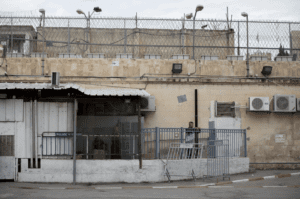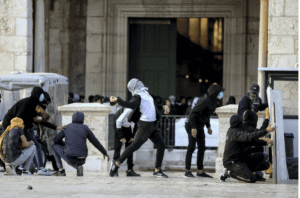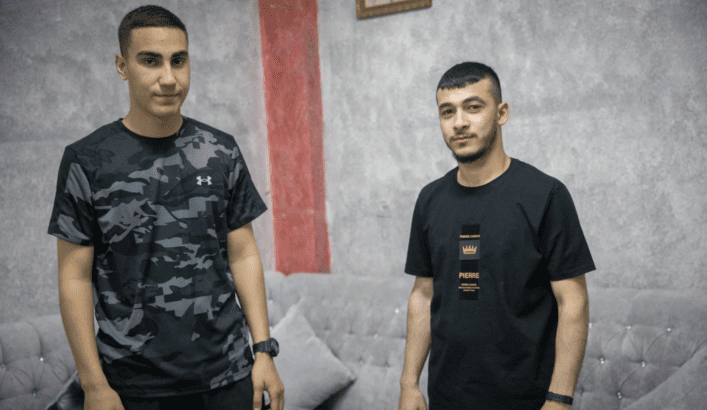Yazan (left) and Muhammad al-Rajbi.
The two say they were subjected to various torture methods by Israel’s Shin Bet security service for over a month, including being locked in a cabinet for hours and bound to a chair for days without food or bathroom access
By Nir Hasson, reposted from Israeli newspaper Ha’aretz, May 23, 2022
Two young Palestinian men, who were ultimately convicted of throwing rocks at police, say they were subjected to torture during more than a month of interrogation by the Shin Bet security service: painfully bound to a chair for full days, placed in solitary confinement, deprived of food and sleep and denied bathroom access.
In the end, each confessed to the rock throwing, and were convicted and sentenced to eight months in prison.
Yazan al-Rajbi is a resident of Jerusalem’s Silwan neighborhood who was still under 21 when he was summoned to Jerusalem’s Russian Compound police station in August of last year. After arriving there, Al-Rajbi – son of Zouheir al-Rajbi, one of the main Silwan activists against Jews moving into the East Jerusalem Palestinian neighborhood – was sent to “Room 4,” the minorities-department investigation room that is notorious among East Jerusalemites. At first, two people who identified themselves as Shin Bet investigators questioned him – one gave the name Nasim and the other called himself Zeev.
Yazan was questioned about an incident during which rocks were thrown at police in the middle of Silwan on July 9. Al-Rajbi told the investigators that he wasn’t in the area that day, and had instead been with a friend in another Jerusalem neighborhood, At-Tur. “They told me, OK. They took all my clothes, gave me prison clothes, put me in a room full of investigators, maybe 12. They sat me down on a chair and began to question me, from five in the evening until four in the afternoon the next day. I told them there were cameras in the place where I was, and that they should go and check. They told me, ‘You’re a liar.’”
Al-Rajbi says this was just the start of an even more hellish investigation.

“Instead of releasing me, they started to question me about another case of stone-throwing that took place five days after the first one,” he says. “I asked them to bring me my phone so I could prove that I wasn’t there at that time, but the investigator refused and called me a liar. They interrogated me for several days, each time for 17 or 19 hours straight.”
Between sessions, al-Rajbi was put in solitary confinement in a room known as “Zinzin” – or dungeon – that he and others have estimated is about 1 meter by 2 meters in size. They say its low ceiling makes it impossible to stand up straight in it.
Al-Rajbi said that during another interrogation, the investigators put him in a low wooden cabinet.
“My head was between my legs, which were cuffed,” said al-Rajbi. “My hands were handcuffed behind me. They left me in the cabinet for two hours or more. When they opened it, I was unconscious. It was like a pressure cooker. I felt that my head was about to explode and that my back would break.”
Al-Rajbi continued, “When I recovered they immediately began to question me on another matter. This time they accused me of collecting money from guys in Silwan to buy fireworks. The day they claimed this happened, I was not in Silwan – I was at a plumbing job at a construction site in Jaffa. I even took a selfie at the site. But I didn’t tell them that. I reserved my right to remain silent and refused to answer any more questions.”
At this point, says al-Rajbi, he was transferred to Megiddo Prison in Israel’s North region and was put into a room there with people who he believes were working with investigators.
“Nine scary people came to my bed, one with a knife,” he said. “They pretended to attack me while others pretended to defend me. One tells me, ‘You’re Zouheir’s son, he was my friend, there’s a picture of him in the department upstairs. I told him to bring me the picture so I can see it. He brings it to me and I can feel that the picture is hot, that it was just printed. I told him, ‘That’s not my father.’ That’s how it was for four days with the informants.'”
After that, al-Rajbi was moved to Ashkelon Prison, he says. There, too, he felt that everyone around him was cooperating with investigators.
“There was one there who gave me chocolate and cigarettes,” he said. “One of them made me swear on the Koran that I didn’t throw stones. One day they told me to come and work with them in the laundry. There, one of them gave me a phone so I could talk with my family. I told him that I don’t remember the number. Suddenly I get a slap from behind. I turn around and I see the investigator Zeev behind me. He started to curse at me and hit me.”
“After that,” al-Rajbi said, “they cuffed my hands and feet, covered my eyes and put me in a car. They wrapped the car’s seatbelt around my neck and that’s how we drove to Jerusalem – me, Zeev, and another person called Weitzman. The entire way, they were questioning me.”
Al-Rajbi was then put back in the Zinzin at the Jerusalem police station, where he says he was interrogated while tied in a painful position to a low chair.

“They left me that way for two days without talking to me,” he said. “Every time my head fell, an alarm was activated to wake me up. I was again forced to pee in my pants. I asked a guard why no one was talking to me, and he said, ‘There is a holiday, Rosh Hashana. There’s no one here.’ When a guard came to release me, I couldn’t stand and he had to lift me up.”
In the end, al-Rajbi broke down. He confessed to throwing two rocks in clashes with police on the Temple Mount in Jerusalem, an offense he was initially not suspected of at all. He said that, following the confession, the torture stopped and he received food and drink.
As part of a plea deal, al-Rajbi was convicted of rioting and assaulting police officers. The indictment says he threw a number of stones at police officers on the Temple Mount and that, in another incident in Silwan, he stood on a roof from which rocks were thrown by other people. Jerusalem Magistrate Court Judge Yaron Mientkavich sentenced him to eight months in prison.
Since his release he has suffered from vision problems, which he says were caused by the torture he says he underwent.
Parallel interrogations
A few days after Yazan’s arrest in August, his 19-year-old cousin Muhammad al-Rajbi likewise arrived at the same Jerusalem police station where Yazan was initially taken.
Muhammad, too, was summoned for questioning following the same stone-throwing incident in Silwan, and he too was interrogated with the use of various torture methods for about a month and a half. Like Yazan, Mohammed also arrived after receiving a summons.
According to Israeli human-rights group B’Tselem, Muhammad said he was tied to a low chair with his hands cuffed, that he received food once a day and that he was denied bathroom access. After 20 days of interrogation he admitted to throwing one stone.
“I confessed because I was exhausted. I was in pain from not being able to go to the bathroom, they didn’t give me enough food and I sat cuffed to a chair for 10 or 15 hours a day.” But he said that, despite the confession, the pressure on him persisted. As with Yazan, he was also subsequently sent to the Megiddo Prison, and he too believes the others there were informants.
From Megiddo, Muhammad was brought back to the Zinzin in the Jerusalem police station, and the questioning continued.
“My entire body hurt from being tied to a chair and from the difficulty of falling asleep in the holding cell,” he told B’Tselem. “They held me in a very small cell and I had to contort my body. I did not get food regularly, and what I did get was very bad. They didn’t allow us to sleep, and the guard was knocking on cell doors.”
After more than 40 days of questioning, an indictment was filed against Muhammad for rioting and assaulting police officers, and for throwing one stone. He was convicted following his confession and sentenced to eight months in prison. As a result of his detention, he says, he dropped out of school and began working as a cleaner. “I’m afraid to go out into the street, afraid of the police,” he said.
The Shin Bet issued the following response to this report: “The two prisoners were convicted of the crimes attributed to them in the indictment and were recently released from prison. Without commenting on the actual claims raised in the question, it will be clarified that the place for the assessment of such claims is via the legal process or, alternatively, as part of review of defendants’ claims in the Justice Ministry, as with any claim filed.”
Nir Hasson is on the staff of Ha’aretz.
OTHER ARTICLES ON ISRAELI TORTURE:
- Israel-Palestine: To end torture, Shin Bet interrogations must be filmed
- What happened in the Israeli police ‘torture room’ in Nazareth?
- Torture of Palestinian prisoners: Time to end Israel’s impunity
- How Israeli doctors enable the Shin Bet’s torture industry
- New Israel Supreme Court ruling gives further backing to use of torture
- Special Report: Israel’s Treatment of Americans
- More
RELATED READING:
- Israeli Soldiers Kill A Palestinian Teen In Jenin
- Israeli forces use Palestinian girl as a human shield in Jenin
- Shireen Abu Akleh’s death exposes Israel for what it is – a murderous regime
VIDEOS:





